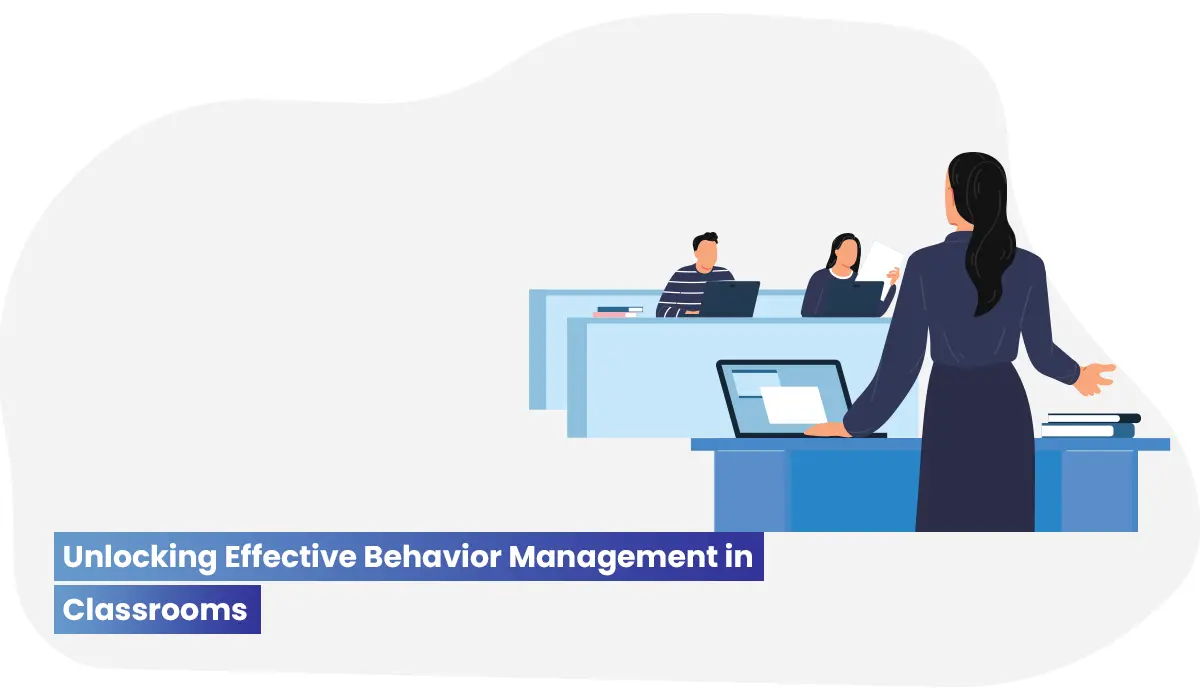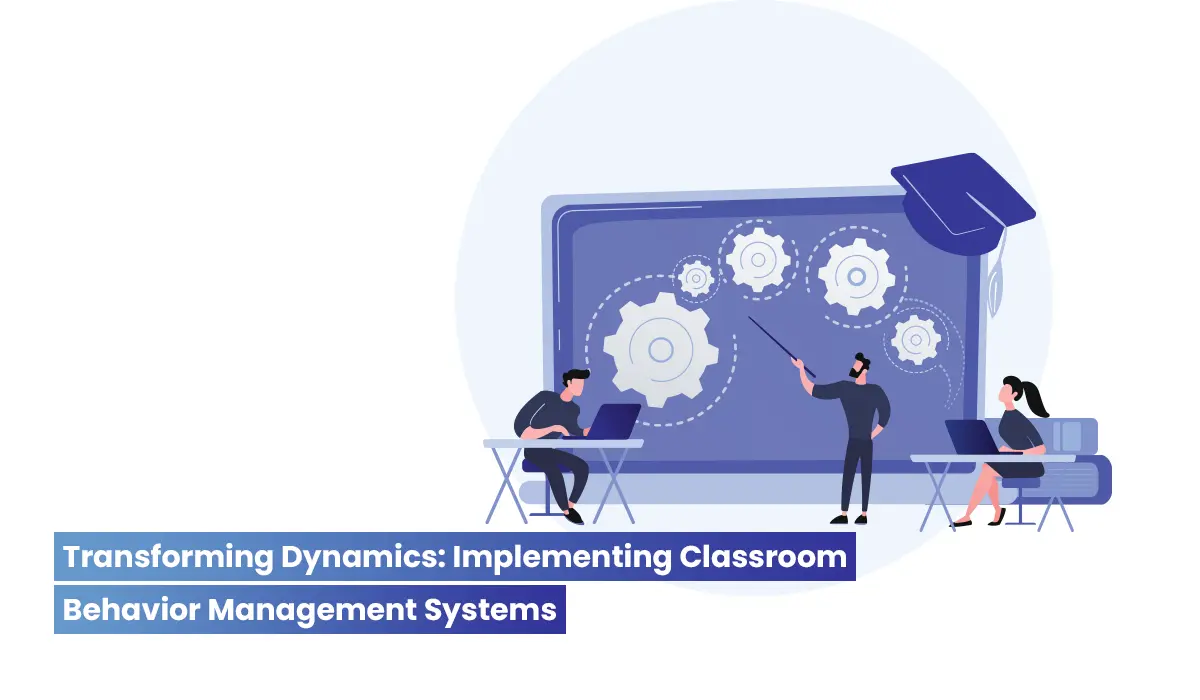Conduct Management and Student Success: Impact on Academic Achievement

Do you agree that success is not just about academics; it's about molding individuals into responsible and ethical contributors to society? In the realm of higher education, fostering academic achievement goes beyond mere textbook knowledge. It involves nurturing a conducive environment where students can thrive academically while imbibing essential life skills and values. One crucial aspect that often goes overlooked is student conduct management, which plays a pivotal role in shaping student success. Institutions that prioritize effective conduct management witness remarkable outcomes in terms of academic achievement and overall student growth.
Evidence suggests that, on average, behavior interventions can produce moderate improvements in academic performance along with a decrease in problematic behaviors. Institutions with robust conduct management programs have seen up to a 25% increase in student retention rates.
The impact of a well-structured conduct management system goes beyond disciplinary actions; it shapes students' character, instills a sense of responsibility, and cultivates a positive learning environment. Let's explore the significant role of conduct management in elevating academic achievement in this blog. Let’s also discover the profound influence it can have on students' overall development, empowering them to excel not only in their studies but also in life.
Understanding Behavior Management in higher education
In the dynamic landscape of higher education, maintaining a positive learning environment is paramount to fostering student success and overall institutional growth. Conduct management plays a pivotal role in achieving this objective, creating a framework that guides students' behavior and interactions within the academic community.
Student conduct management refers to the systematic approach of establishing guidelines, policies, and procedures that govern student behavior and conduct on campus. Its primary purpose is to ensure a safe, respectful, and inclusive environment that nurtures academic excellence and personal growth.
Why do higher education institutions need a comprehensive Conduct Management System?
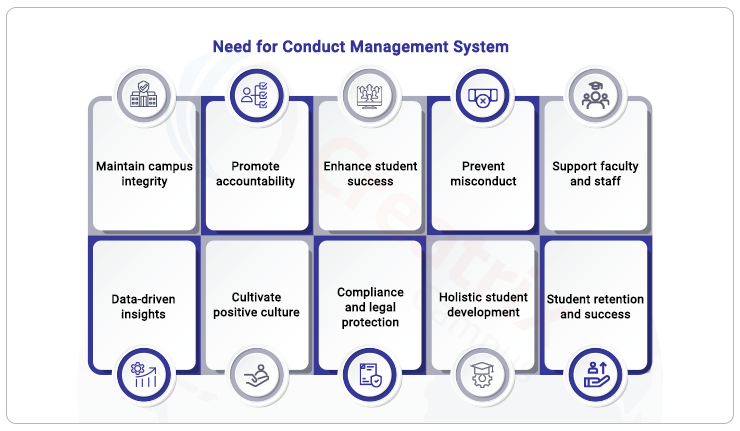
A comprehensive conduct management system is crucial for higher education institutions to uphold their mission and values. It creates a sense of accountability and responsibility among students, faculty, and staff, fostering a positive campus culture that encourages respect, integrity, and responsible decision-making. Such a system not only addresses behavioral issues but also emphasizes restorative practices, promoting personal growth and learning from mistakes.
The link between Conduct Management and Academic Achievement
Research indicates that students who exhibit positive conduct, including respectful behavior, punctuality, and active engagement, are more likely to achieve higher academic performance. A well-managed conduct system fosters a sense of responsibility and accountability, motivating students to be proactive in their learning journey.
On the flip side, disruptive behavior and misconduct can harm learning outcomes. Classroom disruptions, student conflicts, and negative attitudes can hinder the learning process and distract others from focusing on their studies. An effective conduct management system addresses such issues promptly, ensuring minimal disruptions and a focused learning environment.
Numerous studies have emphasized the correlation between conduct management and academic achievement. Institutions with well-implemented conduct policies and support systems have reported improved student retention rates, higher graduation rates, and enhanced student satisfaction. These findings underscore the critical role of conduct management in creating a conducive and supportive atmosphere for academic success.
According to the National Association of Student Personnel Administrators (NASPA), institutions that prioritize conduct management observe a positive impact on student's personal development, overall well-being, and academic growth. As educational leaders and decision-makers, recognizing the significance of conduct management in shaping academic achievement is pivotal in cultivating a thriving learning community.
Creating a Supportive Conduct Management Framework
A robust conduct management framework encompasses various key elements that ensure a supportive and nurturing learning environment. It includes,
- Clear and well-defined conduct policies and procedures
- Transparent communication of conduct expectations and consequences
- Structured system for addressing conduct issues
- Fair and consistent disciplinary measures
- Emphasis on promoting positive behavior among students
- Focus on building a supportive and nurturing learning environment
The importance of proactive measures to prevent conduct issues
Proactivity is key to fostering a positive conduct culture. By taking preventive measures, institutions can minimize conduct issues and create an atmosphere conducive to academic achievement. Educational institutions have adopted various strategies and programs to develop a supportive conduct management framework. Some of them include;
- Engaging students through orientation programs on conduct expectations and values
- Early identification of at-risk students through behavior analysis
- Targeted support and interventions for students facing challenges
- Creating a positive and inclusive school culture
Behavioral Intervention strategies to follow for Academic Improvement
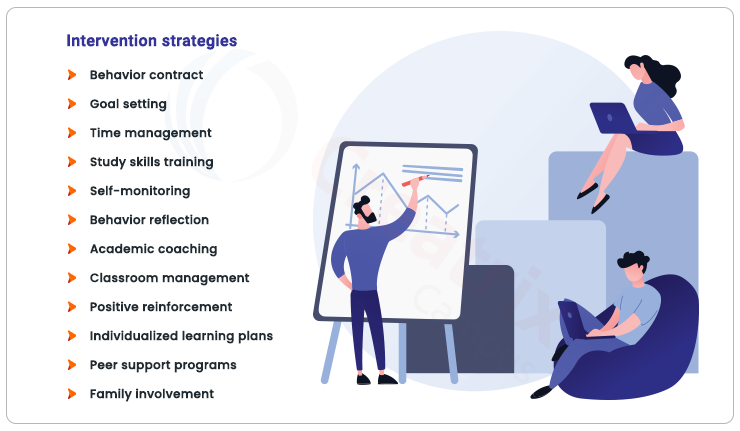
In recent years, the growing concerns surrounding student well-being and mental health have placed significant pressure on behavioral intervention teams to implement successful intervention strategies. Educational institutions have adopted various strategies and programs including developing a supportive conduct management framework.
We have collated some behavioral intervention strategies to follow in order to provide robust support to the campus community.
Behaviour Contract
Implementing a behavior contract that outlines specific academic goals and the corresponding rewards or consequences based on students’ behavior and performance.
Goal setting for academic success
Utilize the student conduct management software to set clear and measurable academic goals for individual students. The platform can track students' progress toward their goals, offering real-time insights and feedback to keep them motivated and on track.
Positive reinforcement and recognition
Implement a rewards and recognition feature in the student conduct management software to acknowledge students' achievements and positive behaviors. Timely and meaningful rewards inspire students to maintain their focus on academic excellence.
Self-monitoring and reflection
Integrate self-assessment tools within the conduct management software, allowing students to reflect on their academic performance regularly. Self-monitoring features empower students to take charge of their learning journey and make informed decisions to improve their academic outcomes.
Time management skills
Incorporate time management resources and tools into the student conduct management software to help students plan and organize their academic schedules efficiently. Reminders and scheduling features assist students in balancing academic tasks and extracurricular commitments effectively.
Study skills training
Provide access to study skills training modules through the conduct management software, offering students guidance on effective study techniques and strategies. This resource equips students with essential learning skills to excel in their coursework.
Mindfulness and Stress Reduction
Introduce mindfulness exercises and stress reduction resources within the student conduct management software. These features promote student well-being and help reduce academic stress, leading to improved focus and academic performance.
Academic support programs
Integrate academic support or advising systems and resources into the conduct management software, providing students with easy access to tutoring services, peer mentoring, and academic advising.
Individualized support plans
Utilize the conduct management software to create personalized support plans for students in need of additional assistance. Customized intervention strategies help address individual challenges and foster academic improvement.
Communication and Collaboration
Leverage the conduct management software as a communication hub to foster collaboration between faculty, staff, and students. Transparent and effective communication channels facilitate a supportive and connected learning community.
Social-Emotional Learning (SEL) integration
Integrate SEL modules and resources within the conduct management software to promote students' emotional intelligence and social skills. SEL-focused tools help students build resilience and navigate social interactions, positively impacting their overall academic performance.
Practical tips to implement Conduct Management
The student conduct management system plays a crucial role in fostering student accountability and responsibility within higher education institutions. By setting clear behavioral expectations and outlining the consequences of misconduct, students are encouraged to take ownership of their actions and choices. When students understand the expectations and the potential outcomes of their behaviors, they are more likely to make responsible decisions that align with their educational goals. To cultivate a culture of responsibility, conduct management practices should incorporate proactive measures. These include proactive communication with students about their conduct, providing guidance on ethical decision-making, and encouraging self-reflection. Additionally, regular check-ins and support from faculty and staff can reinforce the importance of being accountable for one's actions.

By incorporating the below strategies into the conduct management framework, higher education institutions can create an environment that nurtures students' accountability and responsibility. This, in turn, enhances academic achievement and cultivates a positive campus culture focused on personal growth and academic excellence.
- Implement a student conduct code that clearly outlines expected behaviors and the consequences for violations.
- Utilize conduct management software to track and monitor student behavior, identifying patterns that may require intervention.
- Offer workshops and training sessions on ethics, decision-making, and responsible behavior to raise awareness and promote responsible conduct.
- Encourage open and honest communication between students and educators to address behavioral concerns proactively.
- Involve students in the development and review of conduct policies, empowering them to take ownership of their conduct.
- Recognize and celebrate students who consistently demonstrate accountability and responsibility, encouraging positive behavior within the campus community.
- Provide resources and support services to help students manage stress and challenges effectively, promoting resilience and responsible coping strategies.
Collaborative efforts for student success
Academic advisors and student support services play a vital role in supporting student success through conduct management. The collaborative efforts between faculty, staff, and conduct management professionals are crucial in promoting student success. By working together, these stakeholders can create a supportive and cohesive environment that nurtures students' academic and personal growth. The role of academic advisors and student support services vary. Though they both provide guidance, resources, and mentorship to help students navigate challenges, their roles are different. The image below shows the same.
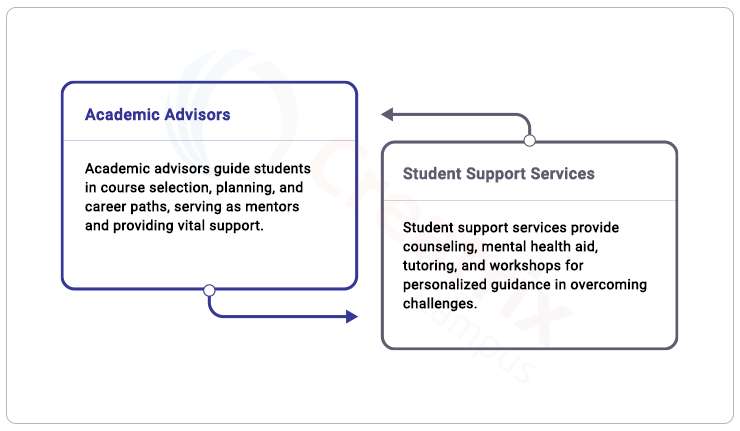
Examples of successful collaborations and partnerships:
- The conduct management professionals work closely with faculty to develop clear conduct policies that align with academic expectations.
- Academic advisors collaborate with conduct management teams to identify at-risk students and provide timely interventions. Additionally, student support services can partner with conduct management to offer counseling and workshops on responsible decision-making and academic integrity.
Measuring the Impact of Conduct Management on Academic Achievement
To gauge the effectiveness of conduct management strategies on student success, institutions can use various methods and metrics. These may include tracking changes in student behavior, academic performance, and retention rates. Conduct management professionals can also conduct evaluations, surveys, or focus groups to gather feedback from students and faculty on the impact of conduct policies and interventions.
The data gathered can be used to enhance the conduct management practices. By analyzing relevant data, institutions can identify patterns, trends, and areas needing improvement. Data-driven insights help refine conduct policies, tailor interventions to specific student needs, and measure the overall effectiveness of conduct management efforts.
Conclusion
Now that we have explored the critical role of conduct management, and how it promotes student success and academic achievement, it is vital that institutional stakeholders invest in conduct management software that can create a supportive environment that empowers students to thrive academically and achieve their full potential.
For a comprehensive student conduct management solution that streamlines processes and enhances student success, visit Creatrix Campus's Student Conduct Management page. Discover how our advanced software can help your institution proactively address conduct issues and create a conducive environment for academic growth. Lets together build a brighter future for our students.


